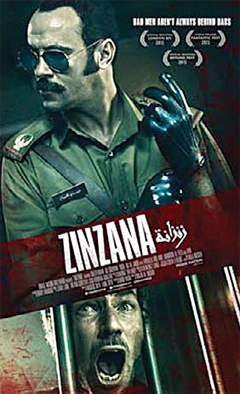 Young Emirati director Majid Al-Ansari's debut feature film "Rattle the Cage" - titled "Zinzana" in the Arab world - is a neo-noir with a Tarantino-esque touch considered the first genre movie of this type to come out of the United Arab Emirates, where accomplished helmers are few. The well-received pic being launched from the Dubai Film Festival into the Middle East is fully financed by prominent Abu Dhabi-based media company Image Nation, which is driving the nascent local film industry. Al-Ansari spoke in Dubai about how he pulled off the rare feat of making an Emirati pic that's likely to travel.
Young Emirati director Majid Al-Ansari's debut feature film "Rattle the Cage" - titled "Zinzana" in the Arab world - is a neo-noir with a Tarantino-esque touch considered the first genre movie of this type to come out of the United Arab Emirates, where accomplished helmers are few. The well-received pic being launched from the Dubai Film Festival into the Middle East is fully financed by prominent Abu Dhabi-based media company Image Nation, which is driving the nascent local film industry. Al-Ansari spoke in Dubai about how he pulled off the rare feat of making an Emirati pic that's likely to travel.
Reuters: The movie is based on a script by two American screenwriters, Lane and Ruckus Skye. How did you get the script?
Majid Al-Ansari: It all started with the Black List. I went through plenty of scripts from there. I'm a genre fanatic, especially Asian cinema. So when I read it, it really stuck with me. In the beginning I had doubts about setting it in the Arab world, but the more I thought about it, the more I said: 'we'll make it work!' We had to finesse it a bit, but I think we managed. It's really very character driven and touches on issues that are global, like addiction and family values, and that's what I love about it.
Reuters: The film takes place "somewhere in Arabia" in a prison cell and there is plenty of power abuse and torture on the part of a psychopathic police officer. Though you've set it in 1987, it would certainly be conceivable to read a political connotation somewhere in the film. Did that ever cross your mind?
Al-Ansari: Honestly no. I wanted to do "Zinzana" because I thought it would be a cool movie to watch. I didn't want to get into the politics of this region where, of course, there is a lot to highlight in that respect. There are a lot of films from the Arab world that are about the social and political issues that we have. I wanted "Zinzana" to be just the opposite of that, almost a counterbalance to the movies that most other Arab filmmakers are doing.
Reuters: As I understand it, Image Nation fully financed the film, which is pretty amazing. How did that happen?
Al-Ansari: I started working in film in several Abu Dhabi entities as an intern a while ago, then slowly from there I got accepted into the formative program at Image Nation and from there I worked with Participant Media and on Nawaf Al-Janahi's "Sea Shadow." Then I shot my first short, and [Image Nation CEO] Michael Garin and others thought that was great. But they wanted me to first learn the business side before I would get to direct. I did that for two-years-and-a-half. Then when "Zinzana" came along I pitched it to them, and got [to direct] it.
Reuters: You have great production values and an amazing cast. Did you get to choose who you wanted on your crew and cast, or did Image Nation do all of that?
Al-Ansari: I got the cinematographer I wanted, Colin Leveque, and the team really kind of guided me to get the talents. It was a collaboration, that's how Image Nation is.
Reuters: What are the distribution prospects outside the Middle East, where it's being released by Vox?
Al-Ansari: We have IM Global selling it internationally outside the U.S. and Cinetic Media for North America.










